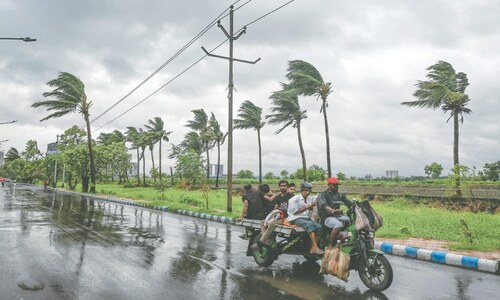TIME was, until the 1980s, when one could board the Khyber Mail in, say, Lahore at 9am on any given day of the week. The following morning sometime before 6am, one would be roused as it swept past the somnolent platforms of Jungshahi. One took advantage of the toilet attached to each cubicle of the air-conditioned sleeping car and emerged 40 minutes later relieved, shaved and showered.
Yes, showered. Those were still the glory days of the Pakistan Railways (PR) and the toilets in all air-conditioned sleeping cars had showers. Then the liveried bearer would stick his head in with his pile of trays with steaming goodies for breakfast. Indeed, breakfast was not all this man served; he would appear, as if by magic, at all mealtimes. The food was no match for the chicken curry, brown rice and egg ‘puteen’ served by railway rest house cooks, but it was passable.
The showers were the first to disappear after the slow decline of this once magnificent institution began at the highest level of the dictatorship of the 1980s. Their removal was a sign of things to come.
If trains as splendid and timeless as the Khyber Mail and Tezgam were being driven to perdition, the much younger Shalimar Express plying between Lahore and Karachi did reasonably well. The seats were comfortable and one could recline; the air conditioning chilled to the bone and one frequently had to ask the attendant to turn it down.
The train left either station at 7am and terminated at 9pm. Meals were trundled in on trolleys and one had a range to select from. It was a fun train to ride because regular educated middle-class folks preferred its air-conditioned parlour car and it was rarely late.
By the middle of the last decade, PR had been reduced to a mere shadow of its past glory. Branch lines were shut down and trains that continued to run were never on time. Delays of up to four hours on short hauls like Lahore-Rawalpindi were not unknown while Lahore-Karachi trains could be as many as 20 hours behind. Things were so bad that it was simply not possible to plan anything in advance if one were taking the train.
After two successive bitter experiences of attempting train journeys in 2005, I resolved never to go anywhere near a train again. It was heart-breaking for a train buff like me, but I kept the promise for nearly nine years.
Recently, I was at a loose end in Sukkur when the early morning flight to Karachi was cancelled due to fog. I tried the intercity bus station and discovered that the entire N-5 was blocked by protesters and that no road traffic had been permitted for three days.
I betook myself to Rohri Junction, once busy with dozens of trains passing through it daily. However, uncertain of the condition of trains I called my friend Waseem Agha of the PR for advice. He kindly ironed out everything and I arrived to find a parlour car ticket and lunch waiting for me.
The train arrived 30 minutes behind time. The seats in the car were in full recline because they were broken. There were two large-screen TV sets at either end of the car playing Indian movies at full volume. The minder of this entertainment was an unwashed lout who sneered at me when I asked him to turn the volume down a bit.
Dinner was served by a filthy bearer — forget the liveried man — and there were no fold-out meal tables for your tray: you placed it on your footrest to eat doubled over. In a word, service was lousy.
In the old days a train running late ‘made up’. But we ended up getting another hour late. Word was that the locomotive did not have optimum pulling because of some fault or the other. Or, said someone else, the lines being from the Raj, trains could not risk travelling faster than 80km per hour. Arriving at 1.30am in Karachi, I resolved anew that I would never again travel by train.
Shalimar Express has, incidentally, been privatised. If this is what privatisation is giving us, may the Lord in heaven deliver us.














































Dear visitor, the comments section is undergoing an overhaul and will return soon.